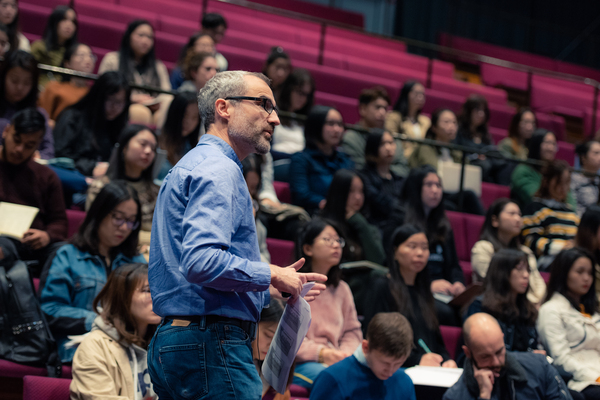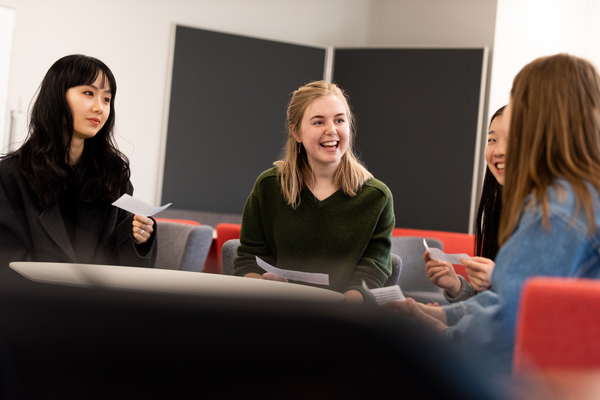View semester dates

BA (Hons) Sociology with Education
Understanding the building blocks for an informed society
Year of entry: 2026/27
View semester dates
1st in the UK for Sociology research impact
12th in the UK for Sociology
72nd in the world for Education
Explore the ideas underpinning the education system and the environment it operates in. Examine how it shapes and influences people and their societies.
Why choose Sociology with Education at York?
Gain a deeper understanding of the disciplines that form the basis of education. Education is increasingly seen as essential to an informed society. It's often considered as the driver for economic growth, social harmony and personal wellbeing. Examine the basis of the modern education system and the impact it has on individuals and wider society.
Benefit from teaching that's research-led and covers real-world issues. You'll reconsider your perspective on some of society's most hotly debated topics. This includes equality, race, health, gender and sexuality. You'll also engage with current debates within the education sector, such as the psychological aspects of education, special educational needs and children’s fiction. In the process, you'll learn to think critically, evaluate evidence and craft convincing arguments.
Craft your own learning experience. Our wide range of option modules allow you to tailor your degree to suit your interests. You'll also have the freedom to conduct research into the areas of sociology or education that you're passionate about.
Prepare for your future. During your studies, you'll have access to careers support, events and opportunities. You'll also have the option of adding a placement year or year abroad to your degree. This allows you to gain invaluable experience working or studying in another country before you graduate.
Course content
- Year 1 - six core modules
- Year 2 - four core modules and two option modules
- Year 3 - one core modules, including a 40-credit dissertation, and four option modules
The course progresses from broad to specialist topics. As you progress you'll focus your studies, choosing option modules to develop your expertise. In your final year you'll undertake independent research leading to an 8,000-word dissertation.
Year 1
Core modules
- Cultivating a Sociological Imagination
- Becoming a Social Researcher
- Investigating Social Problems
- Theorising the Social World
- Meanings and Contexts of Education
- Social Perspectives on Education
Academic integrity module
In addition to the above you will also need to complete our online Academic Integrity module.
Year 2
Core modules
- Inequality, Intersectionality and Resistance
- Doing Research
- Societies and the Climate Crisis
- Education, Power and Society
Option modules
You will also study two option modules. Examples can be found below. Some option module combinations may not be possible. The options available to you will be confirmed after you begin your course.
Sociology
- Body and Society
- Popular Culture, the Media and Society
- Humans and Other Animals
- Social Interaction and Conversation Analysis
- People and the State
- Health and Illness
Education
- Individual Differences in Education
- Educational Diversity
- Sociology of Childhood and Youth
- Education Policy and its Impacts
- Education and the Environment
- Active Learning for Social Change
- Teaching and Learning a Second Language
The options available to you will be confirmed after you begin your course. For further information please get in touch.
Elective modules
You may be able to replace one option module with an elective module, studying a complementary subject, a language or an interdisciplinary topic.
Year 3
The focus of your final year will be your dissertation. You'll work with an academic supervisor to identify and interrogate an original research question, on a topic related to Sociology or Education. You'll write up your results in a 8,000-word extended essay.
Core modules
Option modules
You will also study four option modules. Examples can be found below. Some option module combinations may not be possible. The options available to you will be confirmed after you begin your course.
Sociology
- Creating Sociological Alternatives
- Crime, Gender and Sexuality
- Morbidity, Culture and Corpses
- Spiritual Realities
- Talk at Work
- Working in the Criminal Justice System
Education
- Education and Global Development
- Assessment in Education
- Learning Gender: Exploring the Links Between Gender, Education and Society
- Dressed for Success: Bringing Texts Alive in the Classroom
- Perspectives on Literacy in Education
- Bullying in School
- Child and Adolescent Mental Health
- Understanding Motivations and Emotions in Education
- Reading Development and Disorders
- Language and Psychology
- Positive Psychology in Education
- What Makes a Great Teacher?
- Genetics and Education
- Placement Study
- Individual Study Module
The options available to you will be confirmed after you begin your course. For further information please get in touch.
Elective modules
You may be able to replace one option module with an elective module, studying a complementary subject, a language or an interdisciplinary topic.
Our modules may change to reflect the latest academic thinking and expertise of our staff, and in line with Department/School academic planning.
Learning outcomes
Every course at York has been designed to provide clear and ambitious learning outcomes. These learning outcomes give you an understanding of what you will be able to do at the end of the course. We develop each course by designing modules that grow your abilities towards the learning outcomes and help you to explain what you can offer to employers. Find out more about our approach to teaching and learning.
Learning outcomes for this course
- Define, interpret and explain multi-faceted contemporary issues, and their implications for individuals, groups and institutions, by combining knowledge of key educational policies and/or sociological ideas and debates.
- Access, evaluate and critically review evidence-based claims and/or data concerning educational issues and/or social trends.
- Address emerging social problems effectively by challenging common assumptions systematically and with reference to their educational contexts.
- Design and undertake ethical, responsible research projects which can work with data and draw upon appropriate qualitative and/or quantitative skills to produce empirically rigorous analysis of social issues and/or learning cultures.
- Synthesise and communicate complex information and arguments within educational and/or sociological research in appropriate formats and via a range of media and digital technologies.
- Work creatively in teams by cooperating with others in a manner which recognises diverse views, values and the cultural position of others.
- Identify and plan future learning requirements by recording, reflecting on and evaluating personal learning and development, towards a range of future careers.

In Sociology, there are so many opportunities, placement years and internships available. For example, becoming a Sociology Student Ambassador! This department makes sure that all students are not only looked after, but have opportunities for work and career-building apprenticeships/internships that can be carried out throughout your course.
Fees and funding
The fees and funding information here is for students starting in the 2026/27 academic year.
If you take a year abroad or year in industry you'll pay a reduced rate of fees for that year.
Annual tuition fees
| UK (home) | International and EU |
|---|---|
| £9,535 (TBC) | £26,900 |
The UK government has announced its intention to increase tuition fees from £9,535 to £9,790 for the 2026/27 academic year. We expect this to apply to new UK (home) undergraduate students starting their studies in September 2026.
UK (home) or international fees?
The level of fee that you will be asked to pay depends on whether you're classed as a UK (home) or international student. Check your fee status.
Fees for subsequent years
- UK (home) fees may increase within the government fee cap in subsequent academic years. We will notify you of any increase as soon as we can.
- International fees are subject to increase in subsequent years in line with the prevailing Consumer Price Index (CPI) inflation rate (up to a maximum of 10%).
More information
For more information about tuition fees, any reduced fees for study abroad and work placement years, scholarships, tuition fee loans, maintenance loans and living costs see undergraduate fees and funding.
Funding
We'll confirm more funding opportunities for students joining us in 2026/27 throughout the year.
York, Oxford, Cambridge, Imperial
Just four UK universities are rated Gold for teaching and top ten for research* in the latest national assessment exercises.
* Awarded joint 10th in the Times Higher Education ranking of the Research Excellence Framework 2021.
Teaching and assessment
You’ll study and learn with academics who are active researchers, experts in their field and have a passion for their subjects. Our approach to teaching will provide you with the knowledge, opportunities, and support you need to grow and succeed in a global workplace. Find out more about our approach to teaching and learning.
Teaching format
Our courses consist of a mixture of classroom-based lectures, seminars, and supervisor meetings.
Our research-informed curriculum will provide you with the ability to think critically, develop effective solutions to various work-based problems, and work both independently and as part of a team.
You’ll be taught in a range of specialist subject areas, allowing you to delve deeply into complex topics, explore a whole spectrum of social issues, and develop a resilient, adaptable and challenging mindset that will aid you both within and beyond your study.
In the UK, full-time students are expected to spend 1,200 hours a year learning. That's about 40 hours of classes and independent study each week during semesters. Everyone learns at a different rate, so the number of hours you spend on independent study will be different to other students on your course.
Teaching location
You will be based in the Department of Sociology on Campus East. Your teaching will take place across Campus East and Campus West.
About our campus
Our beautiful green campus offers a student-friendly setting in which to live and study, within easy reach of the action in the city centre. It's easy to get around - everything is within walking or pedalling distance, or you can use the fast and frequent bus service. Take a campus tour.
Assessment and feedback
As you progress, you'll complete a range of assessments designed to help you develop the skills needed to be an effective scholar. Your assessments will be varied, ranging from essays and reports to observational exercises, podcasts and even visual analysis and communication skills workshop design. What assessments you complete will depend on what modules you take.
You’ll submit summative work, which counts towards your final degree score, and formative work, which doesn’t count towards your final grade but gives you the chance to practice techniques and identify areas to improve. We’ll provide detailed feedback on the work you submit, supporting you to develop your academic skills.

York’s careers platform Handshake became my job-hunting sidekick, opening up with many opportunities. After being supported by the Careers Team with application reviews and mock interviews, I finally got an internship at York International Pathway College and got to be a Student Ambassador for Open Day
Careers and skills
We’ll help you focus your career goals, gain valuable experience, and meet the right employers. You’ll also have the opportunity to undergo internships, take part in volunteering, and even pursue a year away from York, either as a placement year or studying abroad.
A significant proportion of our graduates go on to teacher training at primary and secondary levels at prestigious institutions in the UK. A number of students have also secured alternative pathways into teaching and education, including Teach First.
Career opportunities
- Teaching
- Criminal justice, policing and law
- Social research
- Publishing
- Charity sector
Transferable skills
- Problem-solving
- Evaluating evidence
- Forming reasoned arguments
- Thinking creatively
- Considering different viewpoints
Entry requirements
| Qualification | Typical offer |
|---|---|
| A levels | ABB |
| Access to Higher Education Diploma | 30 credits at Distinction and 15 credits at Merit or higher |
| BTEC National Extended Diploma | DDM |
| European Baccalaureate | An overall average of 75% |
| International Baccalaureate | 34 points overall |
| T levels | Distinction overall T Level subjects in Accounting; Design and Development for Engineering and Manufacturing; Design, Surveying and Planning for Construction; Digital Business Services; Digital Production, Design and Development; Digital Support and Services; Engineering, Manufacturing, Processing and Control; Finance; Health; Healthcare Science; Legal Services; Maintenance, Installation and Repair for Engineering and Manufacturing; Management and Administration; Marketing; Science |
| Scottish Highers / Advanced Highers | Scottish Highers - ABBBB Advanced Highers - not required for entry We may also be able to consider three Advanced Highers or a combination of Highers and Advanced Highers, where an applicant does not meet the grade requirement through Highers alone. Please contact us to discuss your qualifications. |
| International foundation programme | Foundation Certificate from our International Pathway College or an appropriate alternative. |
| Other international qualifications | Equivalent qualifications from your country |
Alternative offers
Meeting the following additional criteria may qualify you for an alternative offer.
| Criteria | Adjustment |
|---|---|
| Widening participation | BBC This is conditional upon successful completion of the WP programme including the YorJourney module (Black Access Programme, Next Step York) or successful completion of Realising Opportunities More about widening participation. |
| Contextual offer | BBB |
| EPQ | If you achieve C or higher in the EPQ, you may be eligible for an alternative offer up to one A level grade (or equivalent) below our typical offer. |
| Core Maths | If you achieve B or higher in Core Maths, you may be eligible for an alternative offer up to one A level grade (or equivalent) below our typical offer. |
| MOOCs | If you successfully complete our online course Imagining York: Discovering the everyday , you may be eligible for an alternative offer up to one A level grade (or equivalent) below our typical offer. Details about how to evidence completion of the MOOC will be sent in your offer letter. Please note: you do not need to pay for the certificate. More about MOOCs. |
English language
If English isn't your first language you may need to provide evidence of your English language ability. We accept the following qualifications:
| Qualification | Minimum requirement |
|---|---|
| IELTS (Academic) | 6.5, with a minimum of 6.0 in each component |
| IB English | A score of 4 in English A or 5 in English B (Higher Level or Standard Level) |
| Cambridge CEFR | 176, with a minimum of 169 in each component |
| Oxford ELLT | 7, with a minimum of 6 in each component |
| Oxford Test of English Advanced | 136, with a minimum of 126 in each component |
| Duolingo | Integrated subscores: 120 overall, with a minimum of 105 in each component |
| GCSE/IGCSE/O level English Language (as a first or second language) | Grade C / Grade 4 |
| LanguageCert SELT | B2 with a minimum score of 33/50 in each component |
| LanguageCert Academic | B2 with a minimum score of 33/50 in each component |
| Kaplan Test of English Language | 478 Main Flight score with 444 in each component |
| Skills for English | B2: Merit overall, with Pass with Merit in each component |
| PTE Academic | 61, with a minimum of 55 in each component |
| TOEFL | 87 overall, with a minimum of 21 in each component (taken before January 2026) 4.5 with 5 in Listening and 4.5 in each other component (taken after January 2026) |
| Trinity ISE III | Merit in all components |
| Other English language qualifications | We also accept other English Language qualifications, including various school-leaving certificates. |
For more information see our undergraduate English language requirements.
If you haven't met our English language requirements
You may be eligible for one of our pre-sessional English language courses. These courses will provide you with the level of English needed to meet the conditions of your offer.
The length of course you need to take depends on your current English language test scores and how much you need to improve to reach our English language requirements.
After you've accepted your offer to study at York, we'll confirm which pre-sessional course you should apply to via You@York.
Next steps
Contact us
Get in touch if you have any questions

Dr Cynthia Meersohn Schmidt
Department
Related courses
Discover York








